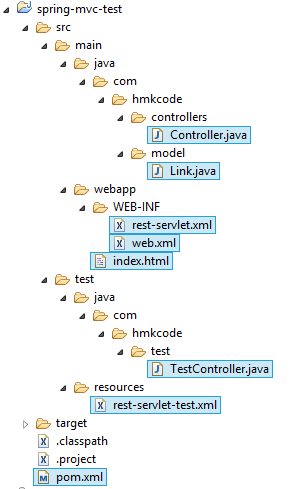Spring MVC Test Using MockMVC
 The goal of Spring MVC Test is to provide an effective way for testing controllers. Spring MVC Test allows performing requests and generating responses without the need for running in a Servlet container. It uses the DispatcherServlet to provide full Spring MVC runtime behavior and provides support for loading actual Spring configuration with the TestContext framework in addition to a standalone mode in which controllers may be instantiated manually and tested one at a time.
The goal of Spring MVC Test is to provide an effective way for testing controllers. Spring MVC Test allows performing requests and generating responses without the need for running in a Servlet container. It uses the DispatcherServlet to provide full Spring MVC runtime behavior and provides support for loading actual Spring configuration with the TestContext framework in addition to a standalone mode in which controllers may be instantiated manually and tested one at a time.
Overview
We will build a simple Spring MVC controller that returns JSON content when receiving GET request. In order to build the service we need the following Java classes and XML files:

Controller.java: Simple Spring MVC controller responding to GET request mapped to /rest/api/get.Link.java: Simple Java model class.rest-servlet: Spring XML configuration file.web.xml: Defining DispatcherServlet.index.html: HTML file with one link calling REST service.TestController: Test class for testing our controller.rest-servlet-test.xml: Spring Configration for testing.pom.xml: Maven pom.xml file listing dependencies and plugin used for this project.
Dependencies
To develop, run and test the service you need the following libraries:
- Spring Framework
<spring.version>5.0.8.RELEASE</spring.version>
<dependency>
<groupId>org.springframework</groupId>
<artifactId>spring-context</artifactId>
<version>${spring.version}</version>
</dependency>
<dependency>
<groupId>org.springframework</groupId>
<artifactId>spring-core</artifactId>
<version>${spring.version}</version>
</dependency>
<dependency>
<groupId>org.springframework</groupId>
<artifactId>spring-beans</artifactId>
<version>${spring.version}</version>
</dependency>
<dependency>
<groupId>org.springframework</groupId>
<artifactId>spring-web</artifactId>
<version>${spring.version}</version>
</dependency>
<dependency>
<groupId>org.springframework</groupId>
<artifactId>spring-webmvc</artifactId>
<version>${spring.version}</version>
</dependency>
<dependency>
<groupId>org.springframework</groupId>
<artifactId>spring-expression</artifactId>
<version>${spring.version}</version>
</dependency>
<dependency>
<groupId>org.springframework</groupId>
<artifactId>spring-test</artifactId>
<version>${spring.version}</version>
<scope>test</scope>
</dependency>
- jUnit
<junit.version>4.12</junit.version>
<dependency>
<groupId>junit</groupId>
<artifactId>junit</artifactId>
<version>${junit.version}</version>
<scope>test</scope>
</dependency>
- hamcrest && jsonpath
Hamcrest and JSON path will be used to assert JSON results
<dependency>
<groupId>org.hamcrest</groupId>
<artifactId>hamcrest-library</artifactId>
<version>1.3</version>
<scope>test</scope>
</dependency>
<dependency>
<groupId>com.jayway.jsonpath</groupId>
<artifactId>json-path</artifactId>
<version>2.2.0</version>
<scope>test</scope>
</dependency>
Complete Maven dependencies is included in pom.xml
Spring MVC Controller
We will build a simple controller that returns JSON. The service will return a single Link object in json format.
Controller.java
package com.hmkcode.controllers;
import org.springframework.web.bind.annotation.RequestMapping;
import org.springframework.web.bind.annotation.RequestMethod;
import org.springframework.web.bind.annotation.ResponseBody;
import org.springframework.web.bind.annotation.RestController;
import com.hmkcode.model.Link;
@RestController
@RequestMapping("api")
public class Controller {
@RequestMapping(value = "/get", method = RequestMethod.GET)
public @ResponseBody Link get(){
System.out.println("Get!");
Link link = new Link();
link.setTitle("HMKCODE BLOG!");
link.setUrl("hmkcode.com");
return link;
}
}
Link.java
package com.hmkcode.model;
public class Link {
private String title;
private String url;
// setters & getters
}
rest-servlet.xml
web.xml
index.html
Spring MVC Test
TestController.java
- @RunWith(SpringJUnit4ClassRunner.class) will run Spring test.
- @ContextConfiguration loads the context configuration in
rest-servlet-test.xml. - @WebAppConfiguration will load the web application context
package com.hmkcode.test;
import javax.servlet.ServletContext;
import org.junit.Assert;
import org.junit.Before;
import org.junit.Test;
import org.junit.runner.RunWith;
import org.springframework.beans.factory.annotation.Autowired;
import org.springframework.mock.web.MockServletContext;
import org.springframework.test.context.ContextConfiguration;
import org.springframework.test.context.junit4.SpringJUnit4ClassRunner;
import org.springframework.test.context.web.WebAppConfiguration;
import org.springframework.test.web.servlet.MockMvc;
import org.springframework.test.web.servlet.setup.MockMvcBuilders;
import org.springframework.web.context.WebApplicationContext;
import static org.springframework.test.web.servlet.request.MockMvcRequestBuilders.*;
import static org.springframework.test.web.servlet.result.MockMvcResultHandlers.*;
import static org.springframework.test.web.servlet.result.MockMvcResultMatchers.*;
@RunWith(SpringJUnit4ClassRunner.class)
@ContextConfiguration(locations = "/rest-servlet-test.xml")
@WebAppConfiguration
public class TestController {
@Autowired
private WebApplicationContext wac;
private MockMvc mockMvc;
@Before
public void setup() throws Exception {
this.mockMvc = MockMvcBuilders.webAppContextSetup(this.wac).build();
}
@Test
public void configTest() {
ServletContext servletContext = wac.getServletContext();
Assert.assertNotNull(servletContext);
Assert.assertTrue(servletContext instanceof MockServletContext);
Assert.assertNotNull(wac.getBean("controller"));
}
@Test
public void test() throws Exception{
this.mockMvc.perform(get("/api/get"))
.andExpect(status().isOk())
.andDo(print());
}
}